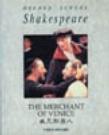威尼斯商人
1997-04
外语教学与研究出版社
(英)莎士比亚
108
无
莎士比亚是中国读者和观众都非常熟悉的一个名字。虽然这位世界著名的戏剧大师的名字已在19世纪中叶中国出版的书刊上出现,但是他的作品直到本世纪初才被介绍给中国的读者。1903年,英国作家兰姆兄妹的《莎士比亚戏剧故事集》第一次被译成中文,某中十个故事的文言译文被编成一个集子,题名为《解外奇谈》;次年,商务印书馆又出版了林纾翻译的同一本故事集的全译本,定名为《吟边燕语》。而直到1921年,莎士比亚的第一个剧本(《哈姆雷特》)才被田汉完整地译成中文。至今,他的全部剧作已为中国读者的所熟悉,每一个剧目起码有两个以上的中译本。 70年代末以来,中国的莎学发展很快。1984年12月,中国莎士比亚研究合正式宣告成立,并在北京和上海组织了1986年和1994年两届莎士比亚戏剧节。许多大学的英文系和中文系都把莎士比亚戏剧列为专业必修或专业选修课。莎士比亚已成为深受中国广大读者喜爱的外国作家。曹禺先生在1984年为中国莎学会会刊《莎士比亚研究》所写的发刊词中的一段话极好地描述了莎士比亚在中国读者心目中的地位。
莎士比亚,(William Shakes beare 1564~1616) 英国著名戏剧家和诗人。出生于沃里克郡斯特拉特福镇的一个富裕市民家庭,曾在当地文法学校学习。13岁时家道中落辍学经商,约1586年前往伦敦。先在剧院门前为贵族顾客看马,后逐渐成为剧院的杂役、演员、剧作家和股东。1597年在家乡购置了房产,一生的最后几年在家乡度过。 莎士比亚是16世纪后半叶到17世纪初英国最著名的作家(本·琼斯称他为"时代的灵魂"),也是欧洲文艺复兴时期人文主义文学的集大成者。他共写有37部戏剧,154首14行诗,两首长诗和其他诗歌。长诗《维纳斯与阿多尼斯》(1592~1593)和《鲁克丽丝受辱记》莎士比亚为"人类最伟大的天才之一"。恩格斯盛赞其作品的现实主义精神与情节的生动性、丰富性。莎氏的作品几乎被翻译成世界各种文字。1919年后被介绍到中国,现已有中文的《莎士比亚全集》。
Prejudice in The Merchant of VeniceLeading Characters in the PlayThe Merchant of Venice: commentaryShylockShakespeare’s VerseDate and TextCharacters in the PlayThe Merchant of VeniceSourcesClasswork and ExaminationsDiscussionCharacter StudyActivitiesContext QuestionsComprehension QuestionsEssaysProjectsBackgroundGovernmentReligionEducationLanguageDramaTheatreSelected Further ReadingWilliam Shakespeare 1564-1616List of Shakespeare’s Plays
125 are scarce cater-cousins. Launcelot To be brief, the very truth is that the Jew having done me wrong, doth cause me--as my father, being, I hope, an old man, shall frutify unto you-- Gobbo I have here a dish of doves that I would bestow 130 upon your worship, and my suit is-- Launcelot In very brief, the suit is impertinent to myself, as your worship shall know by this honest old man; and, though I say it, though old man, yet (poor man) my father Bassanio 135 One speak for both. What would you.? Launcelot Serve you, sir. Gobbo That is the very defect of the matter, sir. Bassanio I know thee well; thou hast obtaind thy suit: Shylock thy master spoke with me this day, 140 And hath preferrd thee, if it be preferment To leave a rich Jews service, to become The follower of so poor a gentleman. Launcelot The old proverb is very well parted between my master Shylock and you, sir: you havwe the grace of 145 God, sir, and he hath enough Bassanto Thou speakst it well. Go, father, with thy son. Take leave of thy old master, and inquire My lodging out. [ To his Servants] Give him a livery More guarded than his fellows: see it done. 10 Stood Dido with a willow in her hand Upon the wild sea-banks, and waft her love To come again to Carthage. Jessica In such a night Medea gatherd the enchanted herbs That did renew old ,AEson. Lorenzo In such a night 15 Did Jessica steal from the wealthy Jew, And with an unthrift love did run from Venice, As far as Belmont. Jessica In such a night Did young Lorenzo swear he lovd her well, Stealing her soul with many vows of faith, 20 And neer a true one. Lorenzo In such a night Did pretty Jessica, like a little shrew, Slander her love, and he forgave it her. Jessica I would out-night you, did nobody come; But, hark! I hear the footing of a man. Enter Stephano Lorenzo 25 Who comes so fast in silence of the night ? Stephano A friend. Lorenzo A friend! what friend? your name, I pray you, friend. Stephano Stephano is my name; and I bring word My mistress will before the break of day 30 Be here at Belmont: she doth stray about By holy crosses, where she kneels and prays For happy wedlock hours. Lorenzo Who comes with her ? Stephano None but a holy hermit and her maid. I pray you, is my master yet returnd ? Religion At this time, England was a Christian country. All children were baptized, soon after they were born, into the Church of England;they were taught the essentials of the Christian faith, and instructed in their duty to God and to humankind. Marriages were performed,and funerals conducted, only by the licensed clergy and in accordance with the Churchs rites and ceremonies. Attendance at divine service was compulsory; absences (without good—medical-- reason) could be punished by fines. By such means, the authorities were able to keep some check on the populace recording births, marriages, and deaths; being alert to any religious nonconformity, which could be politically dangerous; and ensuring a minimum of orthodox instruction through the official Homilieswhich were regularly preached from the pulpits of all parish churches throughout the realm. Following Henry VIIIs break away from the Church of Rome, all people in England were able to hear the church services in their own language. The Book of Common Prayer was used in every church, and an English translation of the Bible was read aloud in public. The Christian religion had never been so well taught before! Education School education reinforced the Churchs teaching. From the age of four, boys might attend the petty school (French petite ecole) to learn the rudiments of reading and writing along with a few prayers; some schools also included work with numbers. At the age of seven, the boy was ready for the grammar school (if his father was willing and able to pay the fees). A thorough grounding in Latin grammar was followed by translation work and the study of Roman authors, paying attention as much to style as to matter. The arts of fine writing were thus inculcated from early youth. A very few students proceeded to university; these were either clever scholarship boys, or else the sons of noblemen. Girls stayed at home, and acquired domestic and social skills — cooking, sewing, perhaps even music. The lucky ones might learn to read and write. Languag At the start of the sixteenth century the English had a very poor opinion of their own language: there was little serious writing in English, and hardly any literature. Latin was the language of international scholarship, and Englishmen admired the eloquence of the Romans. They made many translations, and in this way they extended the resources of their own language, increasing its vocabulary and stretching its grammatical structures. French,Italian, and Spanish works were also translated, and -- for the first time ——there were English versions of the Bible. By the end of the century, English was a language to be proud of: it was rich in synonyms, capable of infinite variety and subtlety, and ready for all kinds of word-play—especially the puns, for which Shakespeares English is renowned. ……
70年代末以来,中国的莎学发展很快。1984年12月,中国莎士比亚研究会正式宣告成立,并在北京和上海组织了1986年和1994年两届莎士比亚戏剧节。许多大学的英文系和中文系都把莎士比亚戏剧列为专业必修或专业选修课。莎士比亚已成为深受中国广大读者喜爱的外国作家。曹禺先生在1984年为中国莎学会会刊(莎士比亚研究》所写的发刊词中的一段话极好地描述了莎士比亚在中国读者心目中的地位: “有史以来,屹立在高峰之上,多少文学巨人们教给人认识自己,开阔人的眼界,丰富人的贫乏生活,使人得到智慧、得到幸福、得到享受,引导人懂得‘人’的价值尊严和力量。莎士比亚就是这样一位使人类永久又惊又喜的巨人。” 莎士比亚生活在16世纪下半叶和17世纪初的英国,即英国文艺复兴时期的鼎盛阶段,前后经历了工英国的两代君主:伊丽莎白女王和詹姆士一世。对于剧作家生平的史料我们掌握得很少,这是因为在他所生活的那个年代人们并不注重保存有关个人的资料,特别是像莎士比亚这样一个并不属于王室、宫廷和教会的戏剧界人士,更得不到当代人的关注。因此,我们至今仍没有一部可靠的莎士比亚传记,对于他生平和创作生涯的许多细节都只有通过他的作品和我们对那个时代的了解去推测。 莎士比亚出生在英国沃里克郡埃文河上的斯特拉特福镇。关于他早年的生活仅有两条记录,那就是保存在斯特圣三一教堂有关他洗礼和婚约的记载。根据记载,威廉·莎士比丽1564年4月26日接受洗礼。按当时的习俗,婴儿出生后应尽早受洗,由此英国学者推断他的出生日期为4月23日。而这种推论的原因之一是五十二年后(1616年)他的忌辰恰恰是4月23日。 莎士比亚的父亲是当地的皮手套工匠,还兼营谷物、羊毛和皮革的买卖,先后担任过镇上的多项公职。莎士比亚四岁那一年,他当选为市政委员会执行官,即镇长。作为长子.莎士比亚可能就读于当地的文法学校。十三岁时家道中落,年轻的莎士比亚可能不得不放弃学业,跟着父亲学手艺,以弥补家用。1582年,年仅十八岁的莎士比亚与邻村农户的女儿安·哈瑟维结婚,安比威廉大八岁。次年,他们的长女苏姗娜出生;1585年,一对双胞胎又降临人间。在此后的七年间,我们没有任何有关莎士比亚的记载。但有一点是可以肯定的,那就是在此期间他离开了家乡,到伦敦去谋生,并加入了剧团。开始了他的戏剧生涯。

无